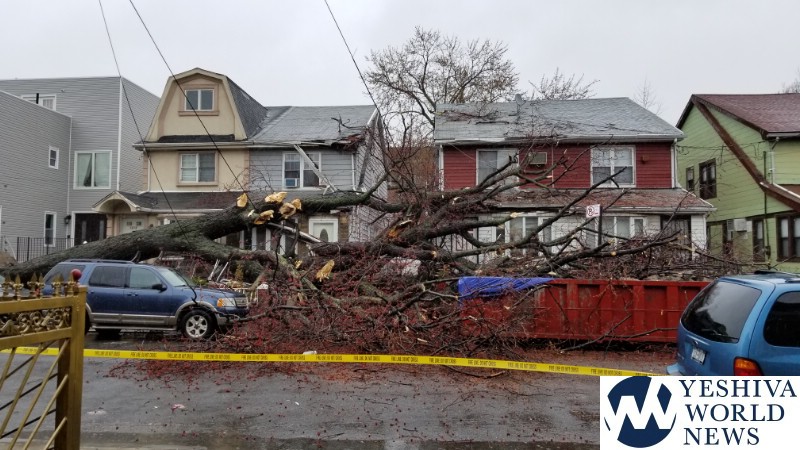Coastal communities in the Northeast experienced damaging high tide flooding and the lingering effects of powerful, gusting winds Saturday even as residents tried to shake off a nor’easter that had already inundated roads and basements, snapped trees and knocked out power to more than 2 million homes and businesses from Virginia to Maine.
All along Massachusetts’ heavily populated coast that includes Boston and Cape Cod, Saturday’s midday high tide saw roaring, white-capped waves crashing onto shorelines, the churning surf battering beachfront homes, dousing docks and harbors and taking huge chunks out of the eroding coastline.
“We’ve been here a long time and we’ve never seen it as bad as this,” said Alex Barmashi, as he took in the fearsome spectacle along Cape Cod Bay in Bourne, Massachusetts.
Up the coast in Scituate, Massachusetts, Becky Smith assessed the damage wrought in the coastal town near Boston, where on Friday powerful ocean waves dumped mounds of sand and rubble on roads and winds uprooted entire trees. “It looks like a war zone,” she said. “Just a lot of debris, big rocks and pieces of wood littering the streets.”
Residents elsewhere bailed out basements and surveyed the damage while waiting for power to be restored, a process that power companies warned could take days in parts.
“There’s still a lot of water out there. There are parts where it really hasn’t receded,” said Rob Reardon, a fire department captain in Duxbury, another hard-hit Massachusetts town. “We’re a coastal community and we deal with this on a regular basis, but this one packed a good punch.”
On New Jersey’s coast, Charlanne and Abby Nosal huddled on the beach in Avalon despite the biting wind and crashing waves. The mother and daughter, who were in town for a cheerleading competition, told The Philadelphia Inquirer the storm may have put a damper on their trip, but not their spirits.
“Any day at the beach,” said Charlanne Nosal, “is a good day.”
“The rest of today will be clean up,” said Miles Grant, after he secured a generator to run a pump to remove standing water from his basement in Marion, Massachusetts. “Usually when you think of bad weather in New England, you think of snow. But it’s been all wind and coastal flooding.”
By Saturday evening, power outages on the East Coast had dipped by about 500,000 from a peak of 2 million earlier in the day. Officials said the lingering wind gusts — up to 40 mph (64 kph) in some areas — were slowing power repair efforts by tens of thousands of utility workers even through the main thrust of the storm had moved some 350 miles (560 kilometers) southeast of Cape Cod that morning.
The death toll from the storm increased by three, with authorities saying at least eight people had lost their lives.
A 25-year-old man in Connecticut, a 57-year-old Pennsylvania man and a 37-year-old Massachusetts man were killed when trees fell on their vehicles Friday. The other five people killed included two children. A man and a 6-year-old boy were killed in different parts of Virginia, while an 11-year-old boy in New York state and a man in Rhode Island, both died. A 77-year-old woman died after being struck by a branch outside her home near Baltimore.
The storm prompted more than 2,800 flight cancellations, mostly in the Northeast on Friday. LaGuardia and Kennedy airports in New York City were brought to a near standstill. A day later, airports from Washington, D.C. to Boston were still reporting dozens of delays and cancellations, but they were recovering.
The storm knocked out Amtrak service between Washington D.C. and New York before it was restored Saturday morning. Other regional train lines were similarly affected.
In Virginia, the 23-mile (37-kilometer) Chesapeake Bay Bridge-Tunnel had reopened and ships were being allowed to enter the Chesapeake Bay.
Meanwhile, Massachusetts Gov. Charlie Baker declared a state of emergency Saturday, joining governors in Maryland and Virginia who had earlier made the declarations.
Floodwaters in Quincy, Massachusetts, submerged cars and trapped people in their homes. Local first-responders and National Guard troops rescued dozens of people overnight and were continuing to implore people not to try and navigate floodwaters on their own.
“There’s still a lot of water out there. There are parts where it really hasn’t receded,” said Rob Reardon, a fire department captain in Duxbury, another hard-hit Massachusetts town. “We’re a coastal community and we deal with this on a regular basis, but this one packed a good punch.”
On New Jersey’s coast, Charlanne and Abby Nosal huddled on the beach in Avalon despite the biting wind and crashing waves. The mother and daughter, who were in town for a cheerleading competition, told The Philadelphia Inquirer the storm may have put a damper on their trip, but not their spirits.
“Any day at the beach,” said Charlanne Nosal, “is a good day.”
(AP)











